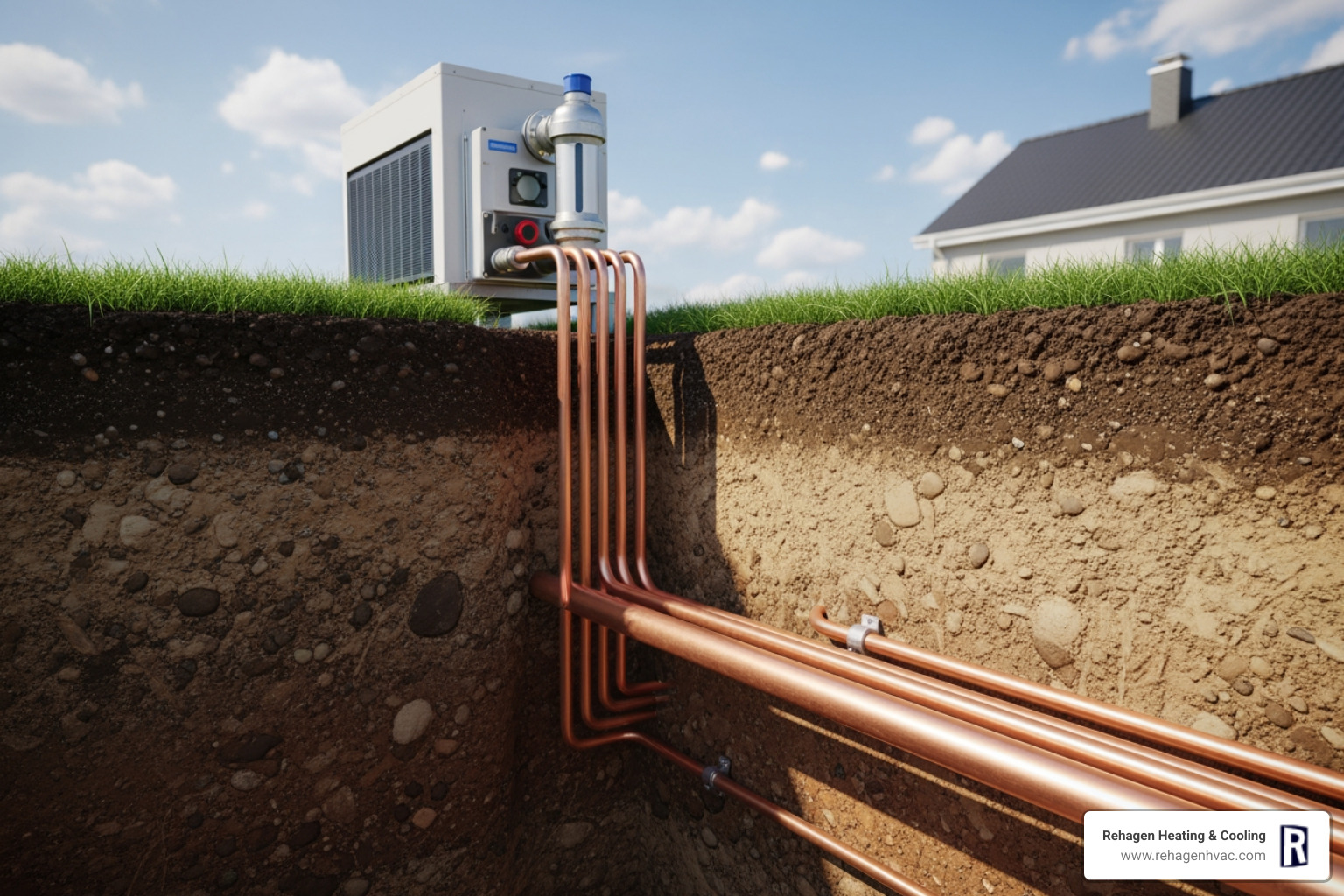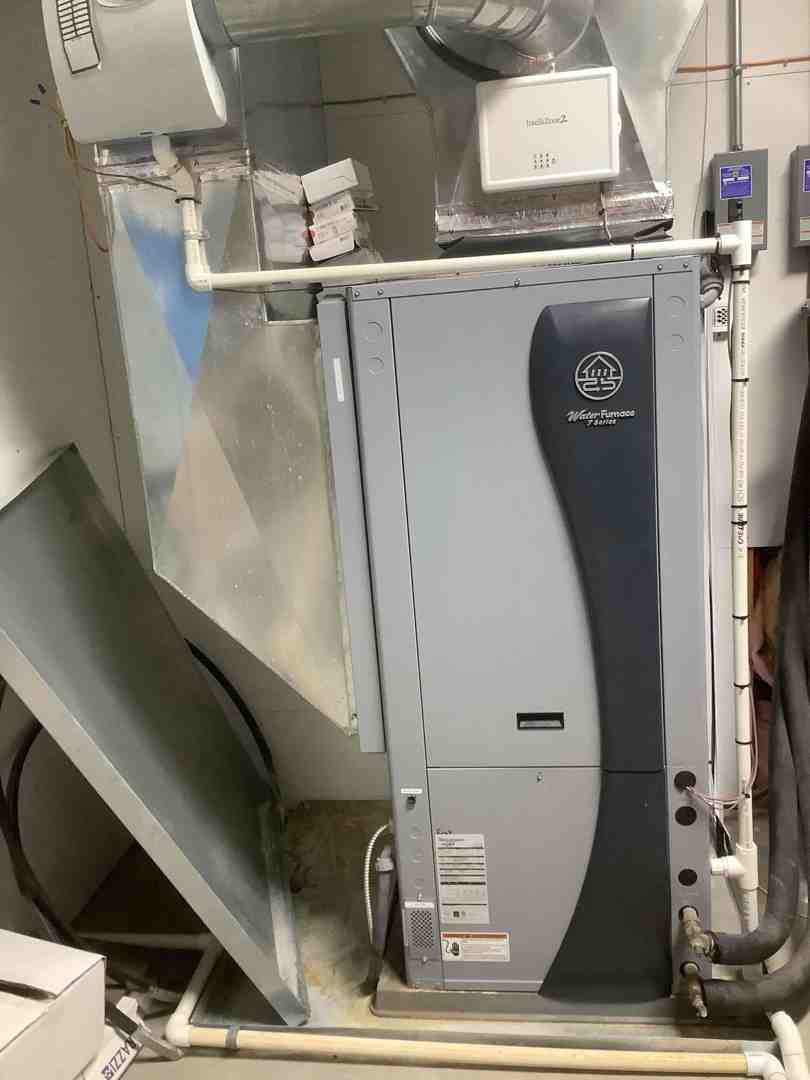Columbia's Deep Dive into Geothermal Energy Systems
Uncover how Columbia University's landmark geothermal energy systems columbia project drives decarbonization & efficiency.


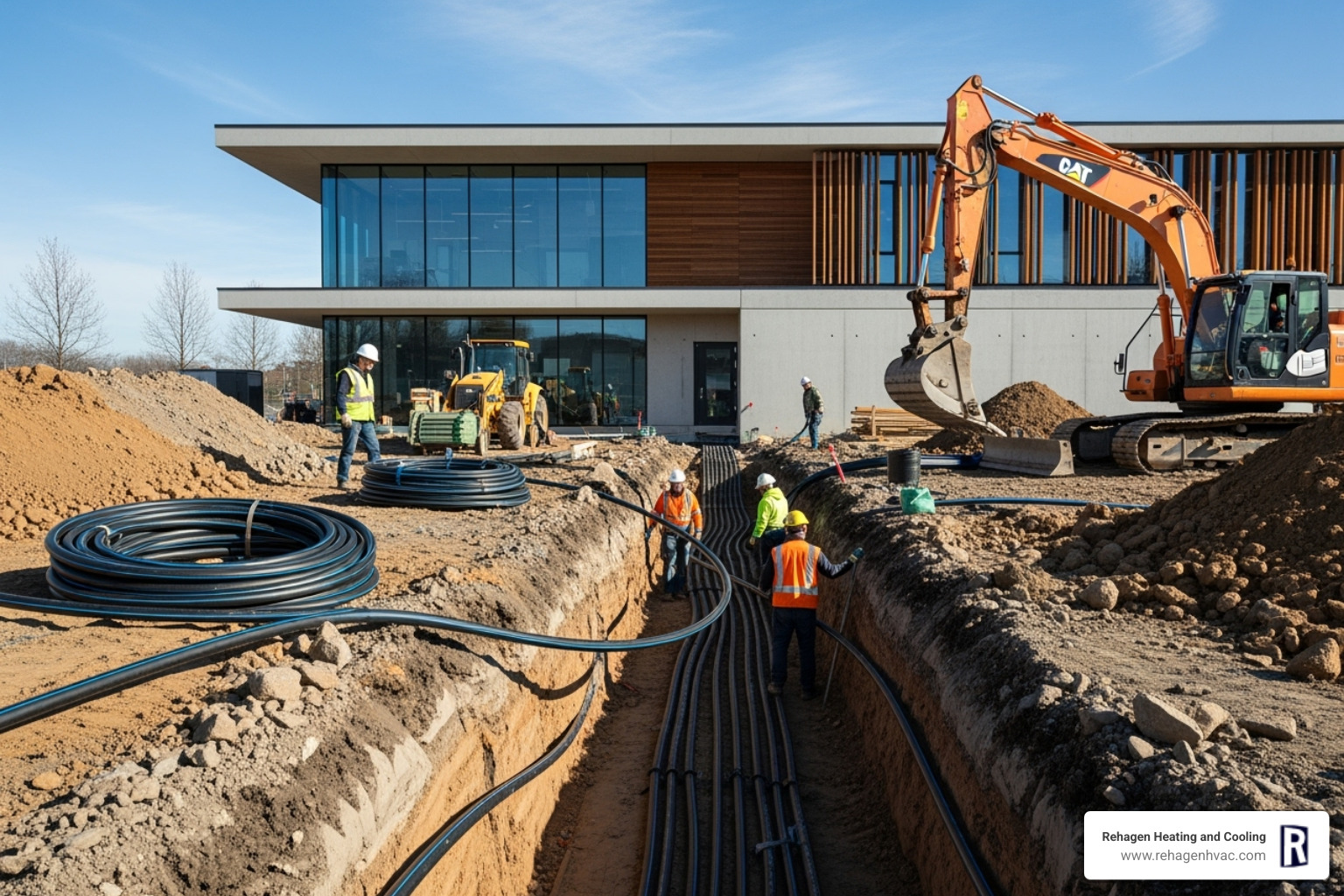
Why Columbia Is Leading the Charge in Geothermal Innovation
Geothermal energy systems columbia represent a groundbreaking shift toward sustainable heating and cooling solutions. From Columbia University's landmark drilling permit in New York to residential applications right here in Central Missouri, this renewable technology is changing how we think about energy efficiency.
Key Facts About Geothermal Energy Systems:
- Ground Temperature: Stays constant at 50-60°F year-round in most areas
- Efficiency: Up to 4 times more efficient than traditional HVAC systems
- Energy Savings: Can reduce heating and cooling costs by 50-70%
- Lifespan: Ground loops last 50-100+ years, indoor units 25+ years
- Federal Tax Credit: 30% credit available through December 31, 2025
Columbia University made headlines by receiving the first geothermal drilling permit in New York State, allowing them to drill 800 feet deep for their Manhattanville campus. This historic project aims to achieve net-zero emissions by 2050 through their "Plan 2030" sustainability initiative.
The same technology powering university campuses works just as well for homes and businesses. Geothermal systems use the earth's constant temperature to provide reliable heating in winter and efficient cooling in summer - regardless of outside weather conditions.
Unlike solar panels or wind turbines that depend on weather, geothermal systems work 24/7. They're quiet, require minimal maintenance, and can significantly reduce your carbon footprint while lowering energy bills.
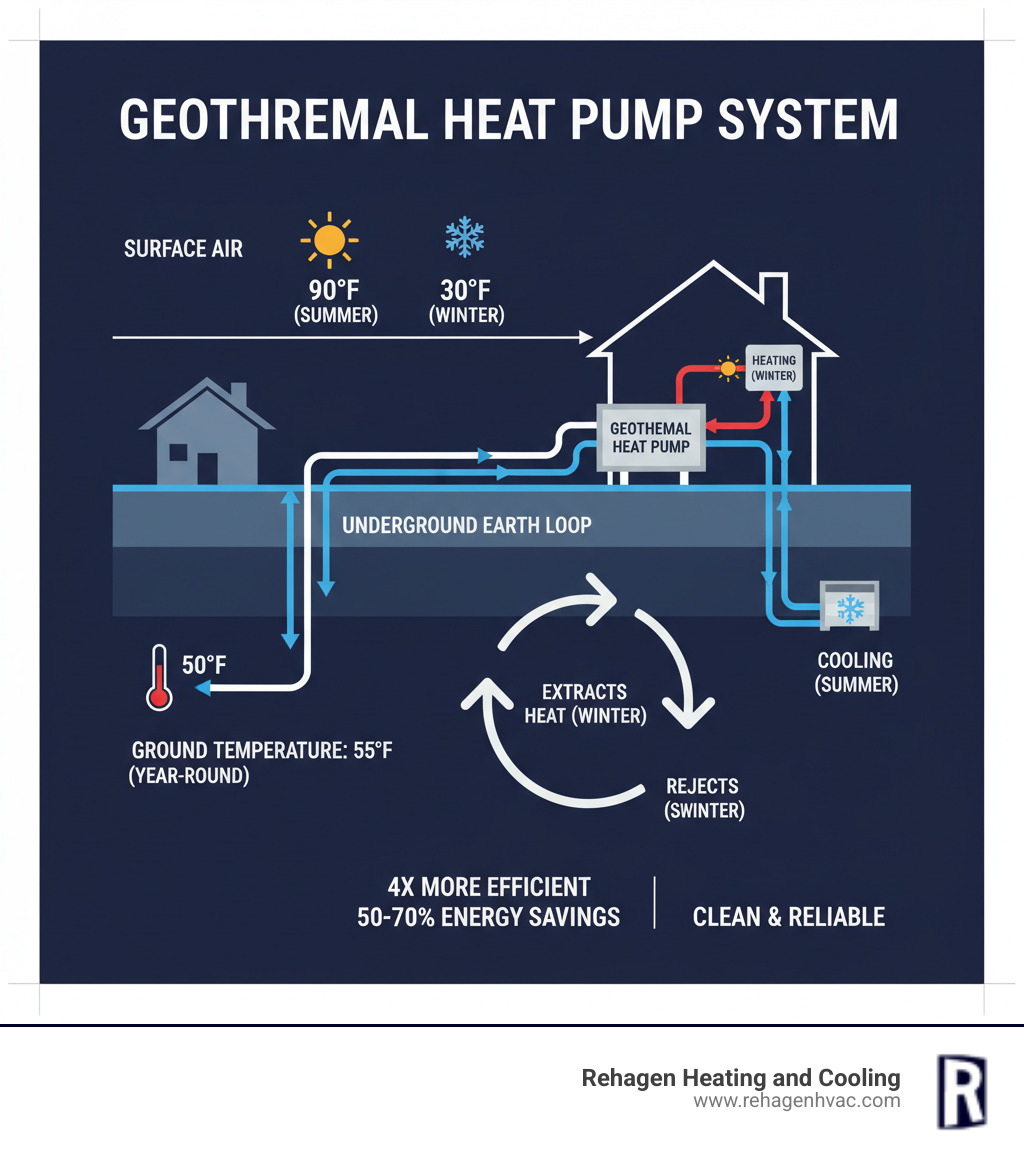
How Geothermal Energy Works: From University Campuses to Your Backyard
Just six feet underground, the earth's temperature stays a constant 50 to 60 degrees year-round. While surface temperatures fluctuate, this underground stability is the secret behind the growing enthusiasm for geothermal energy systems columbia universities and homeowners share.
Ground source heat pumps tap into this stable energy. Instead of burning fossil fuels, these systems simply move heat. They act as energy recyclers, moving heat from the earth into your home in winter and reversing the process in summer to provide cooling.
A closed-loop system of durable pipes filled with a water-based solution is buried on your property. This loop facilitates a highly efficient heat exchange with the earth, whose temperature remains constant, unlike the air above.
Several ground loop configurations are available. Vertical loops are ideal for properties with limited space, like Columbia University's urban campus. Horizontal loops are installed in shallow trenches in properties with more yard space. Pond loops can be submerged in a nearby body of water.
Because of the consistent ground temperature, the system works less hard than traditional HVAC. The result is high efficiency and year-round comfort, regardless of Missouri's weather. Learn more about changing your property's energy use in our guide on Geothermal Heat Pumps.
Types of Geothermal Systems
While all geothermal systems harness the earth's heat, the approach varies by need and location.
Direct Use systems pipe naturally hot water or steam from underground for direct heating applications in buildings, greenhouses, or industrial processes.
Geothermal Power Plants use high underground temperatures to generate electricity. Binary cycle plants, for example, use geothermal heat to vaporize a secondary fluid that spins turbines, producing virtually no emissions.
Geoexchange systems are what we install in Central Missouri. These ground source heat pumps use the region's stable ground temperatures for residential and commercial heating and cooling, which is Why Geothermal Heating is Ideal for our climate.
Improved Geothermal Systems (EGS) are an emerging technology that creates geothermal reservoirs by injecting fluid into hot, dry rock, potentially expanding access to geothermal energy.
Key Components of a Geoexchange System
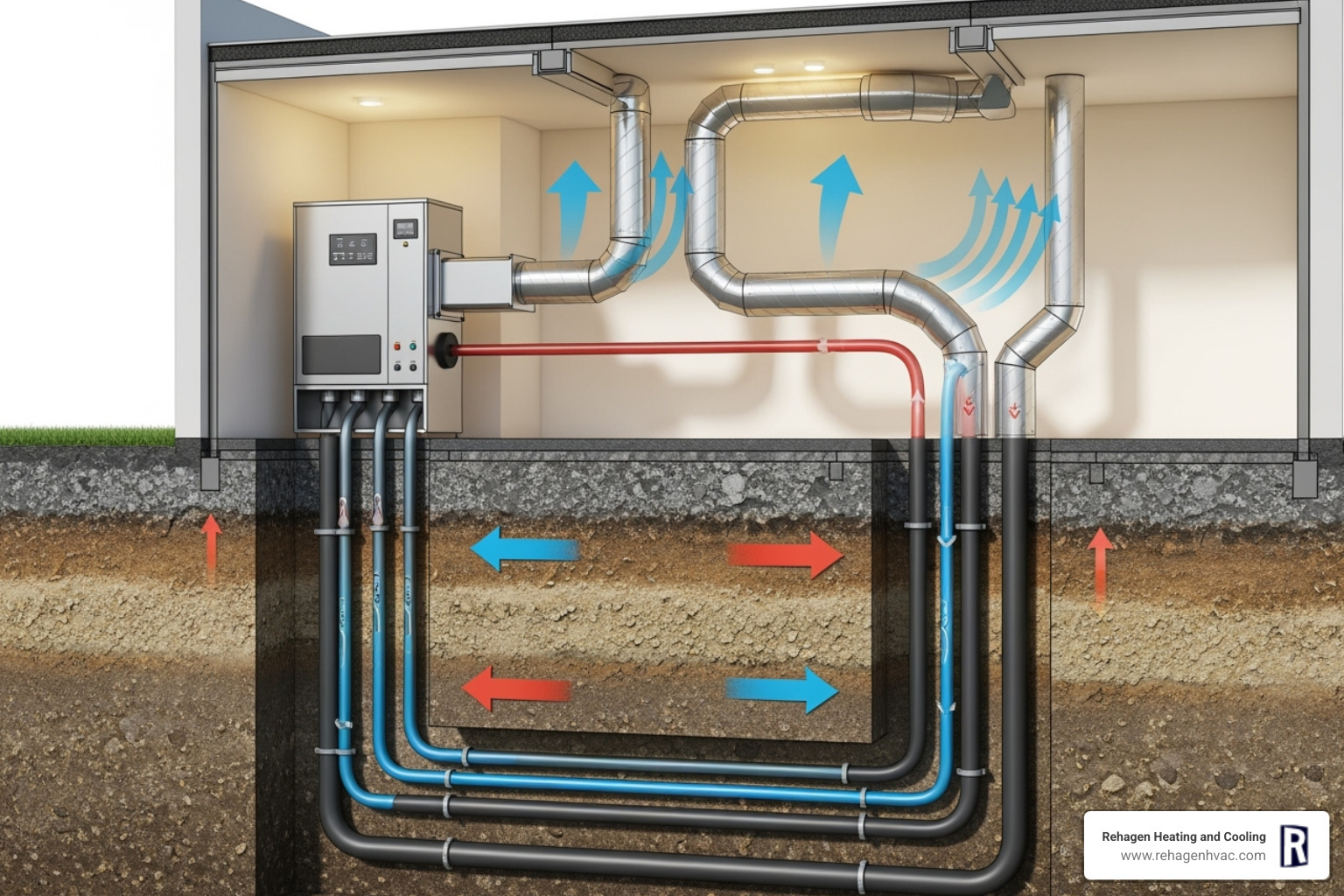
A geothermal system partners your building with the earth through three key components:
The ground loop is a network of durable pipes carrying a water-based solution to exchange heat with the earth. It absorbs warmth in winter and deposits heat in summer, leveraging the ground's consistent temperature for efficiency.
Your heat pump unit, located inside, resembles a conventional furnace. It connects to the ground loop and uses electricity to transfer heat between the loop and your indoor space, rather than burning fuel.
The distribution system, typically ductwork and vents or radiant flooring, circulates the conditioned air or heated water throughout your building to ensure year-round comfort.
Planning these components during new construction can optimize efficiency and installation costs, which is why we recommend considering Ground Source Heat Pumps for New Constructions early in your project.
A Landmark Project: Columbia University's Geothermal Initiative
Columbia University made history by receiving the first-ever geothermal drilling permit in New York State. This project showcases how geothermal energy systems columbia can succeed even in challenging urban environments.
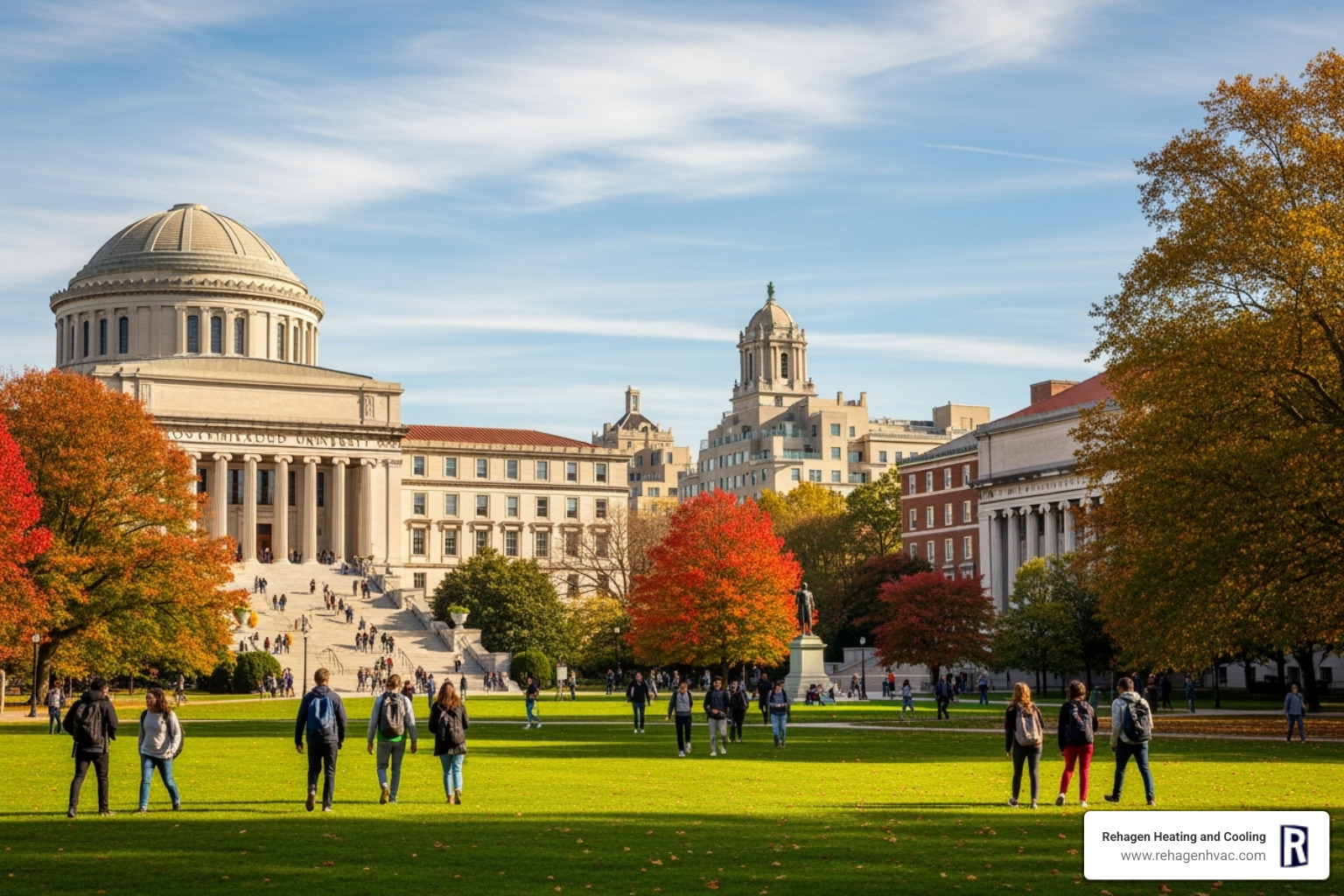
The university's Manhattanville campus project involves drilling 243-meters (800 feet) into Manhattan's bedrock. In one of the world's densest cities, they are tapping into the earth's energy beneath the streets.
Knox Hall is a key part of this initiative, featuring four geothermal wells, each 2,000 feet deep. These wells will replace the building's traditional chillers for heating and cooling.
This project is part of Columbia's Plan 2030, a commitment to achieve net-zero emissions by 2050. By reducing fossil fuel dependence, they prove that large institutions in urban settings can adopt renewable energy. Learn more at Knox Hall to Use Environmentally Clean Geothermal Wells.
Remarkably, the project preserves the building's historic character. The system works invisibly underground, avoiding bulky rooftop equipment and delivering substantial energy savings without compromising architectural integrity.
Benefits for Campuses and Commercial Buildings
Columbia's project highlights the benefits of geothermal energy systems columbia for large institutions and commercial properties:
- Energy savings of 50-60% provide significant budget relief, allowing funds to be reallocated from utilities to other priorities.
- A reduced carbon footprint demonstrates progress toward climate goals, which can be a powerful recruitment and community relations tool.
- Geothermal installations contribute to LEED certification, which can increase property values and attract environmentally conscious tenants or donors.
- Geothermal provides stable energy costs. Unlike fluctuating fossil fuel prices, the earth's constant temperature makes financial planning more reliable.
- Quiet operation creates a better learning and working environment, free from the noise of traditional outdoor HVAC units.
- The long system lifespan (20-25 years for indoor units, 50+ for ground loops) makes geothermal a sound long-term investment.
Columbia's success is a powerful proof of concept for Central Missouri businesses. Rehagen has helped many commercial clients achieve similar results. Learn more about our Commercial Geothermal Heating Solutions.
The Growing Case for Geothermal Energy Systems in Columbia and Beyond
Geothermal energy systems columbia are a compelling choice due to their reliability, efficiency, and environmental benefits. They offer consistent comfort for property owners looking to reduce their carbon footprint.

Geothermal's key advantage is reliability. Unlike solar or wind, it is not dependent on weather conditions. The earth's steady temperature provides a 24/7 power source. This consistent, "firm power" is a valuable alternative to fossil fuels. Research into next-generation geothermal power highlights its potential for clean, uninterrupted energy.
Technological advancements and government incentives are making geothermal more accessible. For homeowners considering the switch, our guide on Upgrading to Geothermal Heating System explains the process.
Comparing Geothermal to Other Renewables
While solar and wind are well-known renewables, geothermal offers unique advantages that make it worth a closer look.
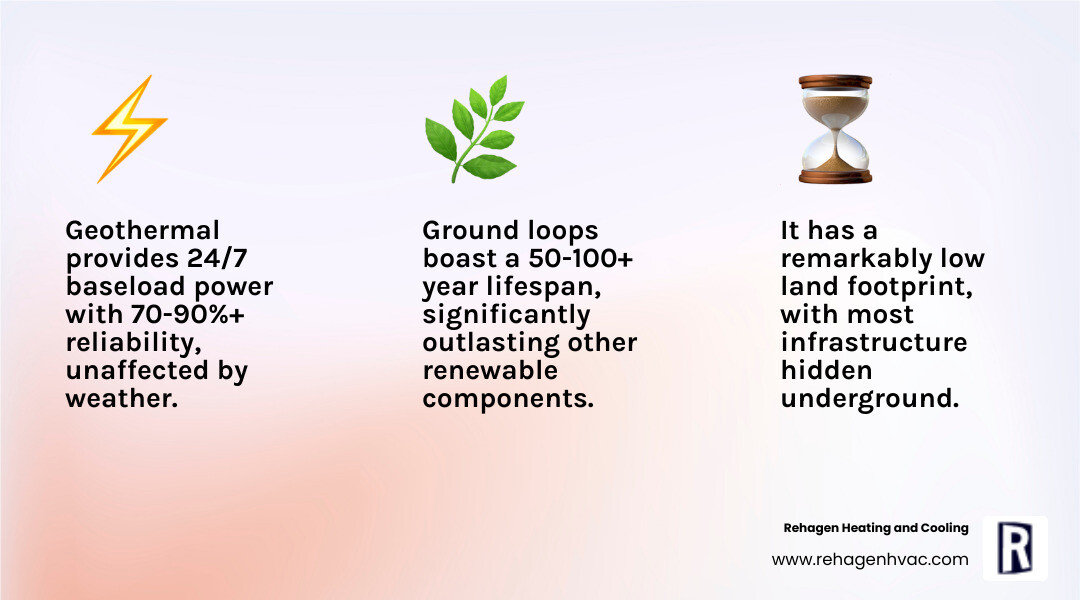
- Reliability: Geothermal systems have a high capacity factor (70-90%) compared to solar (15-30%) or wind (25-45%). This makes geothermal a source of baseload power—steady and dependable.
- Land Use: Geothermal has a minimal land footprint. Once the underground loops are installed, your yard can be used as normal, unlike land required for solar panels or wind turbines.
- Consistency: The system's performance is unaffected by extreme surface weather because it relies on stable underground temperatures, ensuring efficient operation year-round.
- Lifespan: While the upfront cost is higher, geothermal systems have a longer lifespan. Ground loops can last 50-100+ years, compared to 20-30 years for solar panels. This long-term reliability makes it a sound investment.
Financial Incentives for Geothermal Energy Systems in Columbia
While the initial cost of a geothermal system is significant, available financial incentives make it much more affordable.
The Federal Tax Credit provides a 30% credit on installation costs through December 31, 2025. This is a dollar-for-dollar reduction of your tax liability, offering substantial savings.
Additionally, homeowners can expect energy bill savings of 50-70% on heating and cooling. Over the system's long lifespan, these savings can amount to tens of thousands of dollars.
Energy-efficient upgrades like geothermal provide continuous returns. By using the earth's stable temperature, costs remain predictable despite fluctuating energy prices. Learn how to Maximize Savings on a Geothermal Upgrade with our guide.
The Future of Geothermal Energy Systems in Columbia
The future of geothermal technology is advancing rapidly, creating new possibilities for Central Missouri.
Improved Geothermal Systems (EGS) use advanced techniques from oil and gas drilling tech to access geothermal resources in new locations. This technology is lowering costs and drilling time, making geothermal more viable. This leap is expanding access to geothermal energy. According to the IEA's The Future of Geothermal Energy report, next-generation geothermal has the potential to vastly increase global power capacity.
For Central Missouri, these advances promise more efficient systems and lower installation costs in the future. Combining advancing geothermal tech with applications like radiant floor heating makes for an even more attractive option. Explore the Advantages of Geothermal Radiant Floor Heating to see how accessible the future of home comfort is.
Overcoming Challenges in Geothermal Implementation
While the benefits of geothermal energy systems columbia are significant, there are implementation challenges. With over 40 years of experience in Central Missouri, we have solutions for each obstacle.
- High Upfront Cost: The specialized drilling and materials for the underground loop system are more expensive than traditional HVAC. However, this investment is offset by decades of lower energy bills and a 30% federal tax credit.
- Installation Complexity: This requires professional expertise in soil conditions, drilling, and system integration. Inexperienced installation can lead to significant problems.
- Drilling Challenges & Site Constraints: Unexpected rock formations or limited space, especially in urban areas, require careful planning and site evaluation. Columbia University's project, for example, necessitated deeper vertical drilling due to space constraints.
- Regulatory Problems: These can cause delays. While Missouri's regulations are more straightforward than in places like New York, navigating the permitting process still requires experience.
- Public Awareness: Lack of awareness is a challenge. We educate customers on how this proven technology works effectively, even in Missouri's cold winters. For businesses, we address these concerns in our guide to Commercial Geothermal Heat Pumps.
Navigating Installation and Regulations
Successful installation of geothermal energy systems columbia requires an expert who understands the technology and local requirements. Missouri's permitting process is streamlined but still requires professional handling to ensure compliance.
Urban environments often require vertical drilling due to limited space, which involves specialized equipment and careful site access planning.
The key is finding qualified installers with specialized equipment and experience. Since ground loops last 50 to 100 years, proper installation is critical for this long-term investment. You don't want to trust this to someone learning on the job.
We've been installing geothermal systems throughout Central Missouri for over four decades. We know the local soil conditions, understand the permitting requirements, and have the specialized drilling equipment needed for successful installations. If you're in the Jefferson City area and want to explore geothermal options, learn more about our expertise with Geothermal Heating Jefferson City installations.
Frequently Asked Questions about Geothermal Energy
As experts in geothermal energy systems columbia, we frequently answer the same key questions about this technology. Here are the answers to the most common inquiries.
How much does a geothermal system cost?
The initial investment for a geothermal system is higher than for a conventional HVAC system due to the specialized work and equipment required for the underground loop installation. However, this cost is offset by immediate and long-term energy bill savings of 50% to 70%.
A Federal Tax Credit of 30% is also available through December 31, 2025, providing a direct, dollar-for-dollar reduction on your tax bill. The exact price varies by property size and geology, but the long-term savings and tax credit make it a compelling financial decision. Many systems pay for themselves in energy savings over time.
How long do geothermal systems last?
Geothermal systems are exceptionally durable. The indoor components (the heat pump unit) have a typical lifespan of 25 years, outlasting most conventional systems.
The underground ground loop is the most durable part, designed to last 50 to 100+ years. This incredible durability comes from being protected from weather and UV damage. As a result, geothermal systems require very little maintenance.
Are geothermal systems effective in Missouri's climate?
Yes, geothermal systems are highly effective in Missouri's climate. Their performance is independent of the unpredictable surface weather.
The system leverages the stable ground temperature (around 50-60°F) found just a few feet underground. It exchanges heat with this constant source, regardless of heat waves or cold snaps.
- In Missouri's hot summers, the system efficiently moves heat from your home into the cooler earth, resulting in high efficiency cooling.
- In our cold winters, the system extracts heat from the relatively warm ground and moves it into your home with remarkable efficiency.
Geothermal systems are unaffected by air temperature swings, performing efficiently whether it's 100°F or -10°F. Our 40 years of experience confirms that Missouri's climate is ideal for this technology.
Conclusion: Tapping into the Earth's Power
What started as Columbia University's groundbreaking drilling permit has shown us something remarkable: geothermal energy systems columbia aren't just a glimpse into the future—they're here, they work, and they're changing how we think about heating and cooling right now.
This proven technology has moved far beyond the experimental stage. When a prestigious university commits to drilling 800 feet deep to power their campus, and when homeowners across Central Missouri are cutting their energy bills in half year after year, we're talking about a sustainable future that's already taking root.
The Columbia University example demonstrates what's possible on a grand scale, but the real beauty of geothermal lies in how practical it is for homes and businesses of all sizes. Whether you're heating a single-family home in Jefferson City or cooling a commercial building in Columbia, MO, the earth's consistent temperature is working for you 24/7, regardless of what the weather decides to do above ground.
Here in Central Missouri, we've seen how this technology changes lives. Families who once dreaded their winter heating bills now barely think twice about adjusting the thermostat. Business owners who used to budget for unpredictable energy costs now enjoy the peace of mind that comes with stable, efficient operation year after year.
At Rehagen Heating and Cooling, we've been part of this energy revolution for over four decades. We've watched geothermal evolve from a niche technology to the smart choice for anyone serious about efficiency, comfort, and environmental responsibility. Our team takes pride in expert installation of the finest Daikin geothermal systems, ensuring that every project—whether it's a cozy home in Westphalia or a busy business in Eldon—gets the careful attention it deserves.
What excites us most isn't just the technology itself, but the difference it makes in people's lives. The quiet operation that lets you sleep peacefully. The consistent comfort that keeps your family happy. The lower bills that free up money for the things that really matter. The satisfaction of knowing you're doing your part for the environment.
The earth has been storing energy beneath our feet for millions of years, just waiting for us to tap into it. With today's proven systems, generous federal incentives, and experienced installers, there's never been a better time to harness that power for your own comfort and savings.
Ready to find what the earth can do for you? Learn more about Geothermal Heat Pumps and take the first step toward a more efficient, comfortable, and sustainable future.
Related articles
request service











